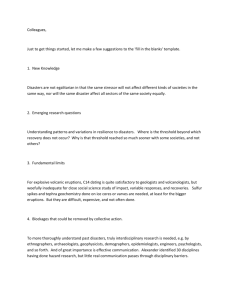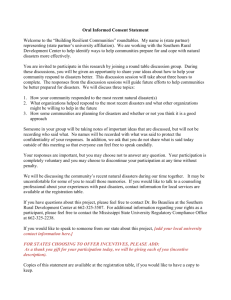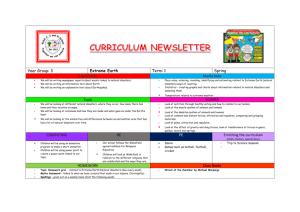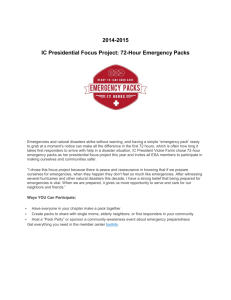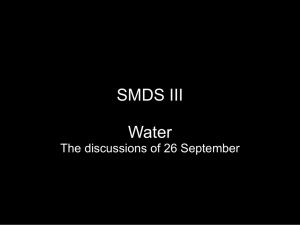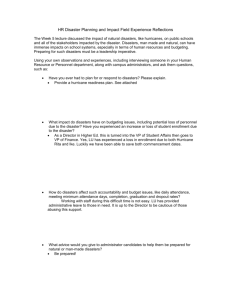1-Kelly Fitzgerald presentation
advertisement
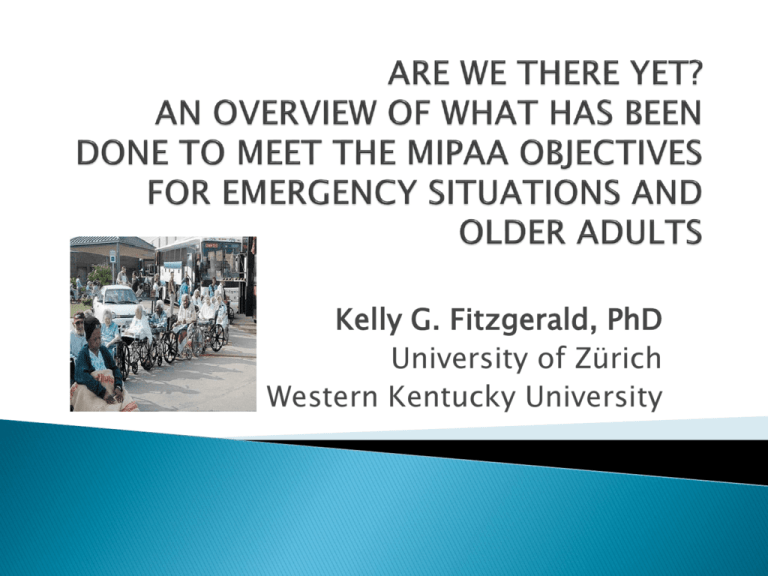
Kelly G. Fitzgerald, PhD University of Zürich Western Kentucky University Myth 1: There are no older people in developing countries. Myth 2: The extended family and community will protect older people at all times. Myth 3: An agency will look after older people. Myth 4: Older people can be covered by general aid distributions. Myth 5: Older people only have themselves to worry about. Myth 6: Older people are waiting to be helped. Myth 7: Older people are too old to work. Why they might be vulnerable: Community Dwelling Live alone or secluded Frail Gender, race, education Language/cultural barriers Limited income and material resources Long-Term Care Facility Chronically ill Higher levels of dementia Depend on staff Evacuation issues How they can contribute: Knowledge of community resources & helping networks Volunteer with relief organisations Assist in system restoration Provide social support Provide experience In emergency situations, such as natural disasters and other humanitarian emergencies, older persons are especially vulnerable and should be identified as such because they may be isolated from family and friends and less able to find food and shelter. They may also be called upon to assume primary caregiving roles. Governments and humanitarian relief agencies should recognize that older persons can make a positive contribution in coping with emergencies in promoting rehabilitation and reconstruction. 1. Equal access by older persons to food, shelter and medical care and other services during and after natural disasters and other humanitarian emergencies. 2. Enhanced contributions of older persons to the reestablishment and reconstruction of communities and the rebuilding of the social fabric following emergencies. WHO response to MIPAA Case studies How did older people fare in disasters in both developed & developing countries Recommends Active Ageing framework Since 2006, the Public Health Agency of Canada’s Division of Aging and Seniors and Centre for Emergency Preparedness and Response have spearheaded efforts to bring together experts from gerontology and emergency management to raise awareness of key issues and create new partnerships with a mandate for advocacy and action. Q: What do we know about caring for frail older persons in disasters… A: Our knowledge synthesis confirms the opinion of AARP after Hurricane Katrina: We know enough to do better. Frailty, Dementia and Disasters: What Health Care Providers Need to Know: A Knowledge Translation E-learning Resource Maggie Gibson, Veterans Care Program, St. Joseph’s Health Care, London, Ontario; Danielle Maltais, Department of Human Science, University of Quebec, Chicoutimi, Quebec; Louise Hardy, Health and Social Services, Yukon Territory Government, Whitehorse, Yukon Territory; Sonja Ruthe, Emergency Program, Corporation of the District of Oak Bay, Victoria, British Columbia; CANADA Contact: maggie.gibson@sjhc.london.on.ca Purpose To contribute to international efforts to reduce the disproportionate vulnerability of older adults in natural and humanmade disasters by developing, piloting, evaluating and disseminating an e-learning resource on frailty, dementia and disasters for health care providers. The objectives of the e-learning resource are to raise awareness of the: Disproportionate vulnerability of older adults who are frail and those who have dementia, in emergencies and disasters; Components of the emergency management cycle and how they apply to this target population; Best practice resources that can be used to improve emergency preparedness, response, recovery and mitigation; and Role of health care organizations and providers in emergency management for older adults who are frail and those who have dementia. Knowledge Translation (KT) Process Elearning Modules Knowledge Synthesis The Seniors and Emergencies: International Working Group on Health Care Providers and Continuity of Health Services (IWGHP) sponsored by the Public Health Agency of Canada provided content expertise. Content was formatted as a powerpoint presentation and piloted in an invited workshop in London, ON (N~50). E-learning Development Care providers and educators from across Canada (N=14) provided feedback on storyboards and the first version of the e-learning tool as it evolved from powerpoint to e-learning modules. Two in-person pilots were conducted in each of Whitehorse, YK (N=33) and Chicoutimi, QC (N=17). An on-line pilot was conducted in South Vancouver Island, BC (N=13). Webhosting A KT Resource Group provided technical guidance in support of webhosting by CDRAKE at www.dementiaknowledgebro ker.ca Emergency Management This Module provides an introduction to: • The vulnerability of older people who are frail and those who have dementia in disasters; • The components of the emergency management cycle. Preparedness This Module uses an extreme weather scenario to illustrate : Response This Module invites • What can happen when a health learners to: care provider doesn’t pay • Reflect on how health care attention to emergency providers can contribute to the preparedness; response component of the • How to help clients and their emergency management cycle; caregivers prepare for an • Become aware of two best emergency. practices – Psychological First Aid and the SWiFT triage tool. Recovery and Mitigation In this Module learners: • Learn about the importance of addressing the recovery challenges of older adults; • Reflect on how care providers can contribute to mitigation activities; • Are encouraged to complete an Emergency Management Action Plan. UN Department of Economic and Social Affairs report “Regional Dimensions of the Ageing Situation” First review & appraisal at national, regional & international level African region highlights: ◦ Drought, floods, and pestilence (along with other natural disasters), & forced migration to displacement camps ◦ Disasters impede poverty reduction ◦ Disasters compound other problems and older people can not fend for themselves or access relief HelpAge has 20+ years' experience of working with and for older people in emergencies. They work to ensure that older people are included in immediate and longterm humanitarian relief efforts on the ground, and in humanitarian policies and guidelines. www.helpage.org Economic & Social Commission for Asia & the Pacific (ESCAP) AUSTRALIA: Out of your budget for programmes for older persons, which areas receive the highest budgetary allocation? Please rank the areas below in order of budget allocation. Provision of old age pension schemes Access to affordable health care Development and strengthening of geriatric services Provision of long-term care services for older persons Training and support for caregivers 1 2 7 3 4 Provision of affordable and age-friendly housing for older persons Research on ageing Support to older persons in emergency and conflict situations Other, please specify: 6 5 [1 = highest amount, 9 = lowest amount] Source: United Nations Economic and Social Commission for Asia and the Pacific, Regional Survey on Ageing 2011: Australia Name of the coordinating body - Office for an Ageing Australia http://www.health.gov.au/internet/publications/publishing.nsf/Content/ageing-un-report-regional+survey-ageing-2011-toc~i.htm Issue : Emergency situations Objective 1: Adequate and appropriate access of older persons to disaster risk reduction measures and management plans, including food, shelter and medical care and other services before, during and after natural disasters and other humanitarian emergencies. Objective 2: Enhanced contributions of older persons to the reestablishment and reconstruction of communities and the rebuilding of the social fabric following emergencies. 3 Actions: *Ensure that the needs of older persons are addressed in disaster risk reduction and management plans. *Ensure the voice of older persons is heard in response to disasters and in reducing the impact of climate change. *Address the issue of social isolation of internally displaced older persons in time of social conflict and emergency situations. Source: ESCAP - Preparatory Meeting for the Asia-Pacific Intergovernmental Meeting on the Second Regional Review and Appraisal of the Madrid International Plan of Action on Ageing Country Reports 2012 Implementation of the UNECE Regional Implementation Strategy (RIS) of the Madrid International Plan of Action on Ageing (MIPAA) ◦ http://www.unece.org/pau/age/mica2011/country_reports_2012.html Quick review of several English reports do not mention ‘disasters’ or ‘emergencies’ (as related to disasters) Probably NOT!
